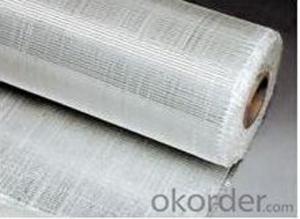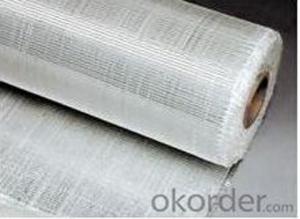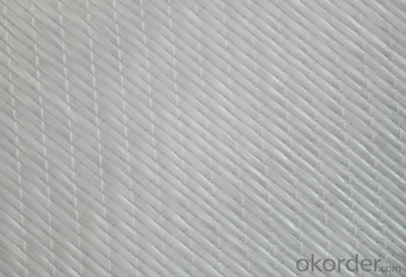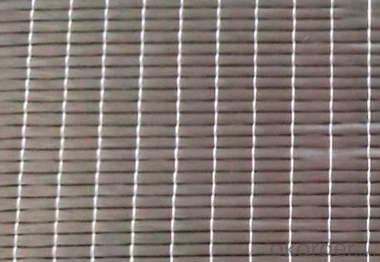Fiberglass Unidirectional fabric 600gsm
- Loading Port:
- Shanghai
- Payment Terms:
- TT or LC
- Min Order Qty:
- 5000 kg
- Supply Capability:
- 1000000 kg/month
OKorder Service Pledge
OKorder Financial Service
You Might Also Like
Fiberglass Unidirectional fabric 600gsm
Description
Fiberglass unidirectional fabric is the product combining the roving in certain angel of 0 ℃ or 90 ℃ with polyester yarn.
Product Traits
• Fiber straight arranged, fiber strength be ultimately used.
• No powder or emulsion, sink quickly, easy to operate.
• Easy to design, high strength in one direction.
Applications
Mainly be used as reinforced materials in the composite material industry.
• Matrix: unsaturated polyester resin, vinyl ester resin, epoxy resin and phenolic resin etc.
• Craft: winding, pultrusion, hand lay up, etc.
• Ultimate products: storage tank, tube, pultruded profiles, FRP body of boat, etc.
Specifications
specifications
Fibre type
0°Roving
90°Roving
Overall weight
Width
(g/㎡)
(g/㎡)
(g/㎡)
(mm)
EDW227
E-Glass
—
227
227
1524
EDW350
E-Glass
—
350
350
1524
EDW450
E-Glass
—
450
450
1524
EDJ600
E-Glass
480
120
600
1524
EDJ800
E-Glass
600
200
800
1524
EDJ1000
E-Glass
600
400
1000
1524
Packaging: Wrapped in PVC and placed within a cardboard carton.
Image:
FAQ
a.Pacage
Each CHEMICAL FIBER GRIDDING CLOTH is wound onto a paper tube The roll is wrapped up with plastic film,and then packed in a cardboard box. The rolls can be vertically or horizontally placed. For transportation, the rolls can be loaded into a container directly or on pallets.
b.Product storage:
Unless otherwise specified, CHEMICAL FIBER GRIDDING CLOTH should be stored in a dry, cool and rain-proof area. It is recommended that the room temperature and humidity should be always maintained at 15℃~35℃ and 50%~75% respectively.
- Q:How does fiberglass mat tissue perform in terms of moisture resistance?
- Fiberglass mat tissue is known for its excellent moisture resistance properties. The material is made up of tightly woven fiberglass strands, which create a barrier against moisture penetration. This makes it highly effective in preventing water or moisture from seeping through and damaging underlying surfaces or structures. Additionally, the resin used to bind the fiberglass strands together also adds an extra layer of protection against moisture, making it even more resistant to water and humidity. Overall, fiberglass mat tissue is a reliable choice when it comes to moisture resistance, making it suitable for various applications where preventing water damage is crucial.
- Q:What is the flexibility of fiberglass mat tissue?
- The flexibility of fiberglass mat tissue is high, as it can easily bend and conform to different shapes and surfaces without breaking or losing its structural integrity.
- Q:Can fiberglass mat tissue be used for roofing applications?
- Yes, fiberglass mat tissue can be used for roofing applications. It is commonly used as a reinforcement material for roofing systems, providing added strength and durability. It helps to prevent cracking and increase the overall lifespan of the roof.
- Q:What is the lifespan of fiberglass mat tissue?
- The longevity of fiberglass mat tissue can differ based on a range of elements, including material quality, exposure conditions, and maintenance level. Nevertheless, fiberglass mat tissue is generally recognized for its resilience and extended lifespan. By ensuring correct installation and consistent upkeep, fiberglass mat tissue can endure for numerous decades. Its resistance to corrosion, moisture, and UV radiation further contributes to its longevity. Furthermore, fiberglass mat tissue is frequently employed in roofing, insulation, and reinforcement applications, engineered to withstand challenging environments and deliver enduring effectiveness.
- Q:How does fiberglass mat tissue perform in terms of mold and mildew resistance?
- Fiberglass mat tissue possesses exceptional mold and mildew resistance. Its inherent moisture resistance prevents the proliferation of mold and mildew. Moreover, fiberglass is impermeable and unsuitable for the flourishing of these microorganisms. Furthermore, fiberglass mat tissue finds extensive usage in areas with high humidity, like bathroom walls or showers, and has proven highly efficient in deterring mold and mildew growth. All in all, fiberglass mat tissue exhibits outstanding performance in terms of mold and mildew resistance, rendering it a dependable option for situations where these issues are prominent.
- Q:Can fiberglass mat tissue be used for insulating ductwork?
- Yes, fiberglass mat tissue can be used for insulating ductwork. Fiberglass mat tissue is a type of insulation material that is made from fine glass fibers. It is a lightweight and flexible material that can be easily installed around ductwork to provide thermal insulation. Fiberglass mat tissue has excellent insulating properties and can help prevent heat loss or gain in ducts, improving energy efficiency. It also helps to reduce condensation and dampen noise transmission. Furthermore, fiberglass mat tissue is resistant to moisture, fire, and pests, making it a suitable choice for insulating ductwork in various environments.
- Q:What are the different grades of fiberglass mat tissue available?
- In the market, you can find various grades of fiberglass mat tissue. These grades differ in terms of their weight, thickness, and strength. The most popular grades include lightweight, medium-weight, and heavyweight fiberglass mat tissue. When it comes to lightweight fiberglass mat tissue, it is generally thinner and lighter compared to other grades. It is commonly used in situations where flexibility and easy handling are important. This grade is suitable for projects like laminating lightweight structures, making molds, and doing repairs. If you're looking for a versatile option that offers a balance between strength and flexibility, medium-weight fiberglass mat tissue is the way to go. It is widely used in boat building, automotive repairs, and general fiberglass reinforcement. This grade provides sufficient strength while still being manageable to work with. On the other hand, if you need superior strength and durability, heavyweight fiberglass mat tissue is the grade for you. It is the thickest and heaviest grade available in the market. This grade is perfect for applications that require high structural integrity, such as construction, aerospace, and marine industries. Apart from these standard grades, there may be variations and special grades available depending on the manufacturer and the specific requirements of your project. It is crucial to consult with a supplier or manufacturer to determine the most suitable grade of fiberglass mat tissue for your particular application.
- Q:Is fiberglass mat tissue suitable for insulation in educational facilities?
- Yes, fiberglass mat tissue is suitable for insulation in educational facilities. It offers excellent thermal insulation properties, is easy to install, and provides effective soundproofing. Additionally, it is fire-resistant, durable, and cost-effective, making it a practical choice for educational buildings.
- Q:Are there any health risks associated with fiberglass mat tissue?
- Fiberglass mat tissue poses potential health risks indeed. Its composition consists of minuscule glass fibers that can be released into the air when the material is cut, sanded, or disturbed. Inhaling these fibers can lead to skin, eye, and respiratory irritation. Immediate exposure may cause coughing, wheezing, and breathing difficulties. Prolonged exposure to fiberglass fibers has been associated with severe health complications, including lung damage and an elevated likelihood of developing respiratory conditions like asthma or bronchitis. To mitigate exposure and potential health issues, it is crucial to adhere to proper precautions, such as wearing protective clothing, goggles, and a mask when handling fiberglass mat tissue.
- Q:How does fiberglass mat tissue perform in terms of thermal expansion?
- With a relatively low thermal expansion coefficient, fiberglass mat tissue expands very little when subjected to heat. This quality makes it a superb choice for situations where maintaining thermal stability is of utmost importance. The tightly woven structure of fiberglass mat tissue effectively controls the material's expansion and contraction, even under extreme temperatures. As a result, it demonstrates outstanding dimensional stability and the ability to withstand thermal stresses. This characteristic enables fiberglass mat tissue to retain its structural integrity when exposed to drastic temperature changes, which is why it is widely recognized as an ideal material in industries like aerospace, automotive, and construction, where dealing with thermal expansion and contraction can be particularly challenging.
1. Manufacturer Overview |
|
|---|---|
| Location | |
| Year Established | |
| Annual Output Value | |
| Main Markets | |
| Company Certifications | |
2. Manufacturer Certificates |
|
|---|---|
| a) Certification Name | |
| Range | |
| Reference | |
| Validity Period | |
3. Manufacturer Capability |
|
|---|---|
| a)Trade Capacity | |
| Nearest Port | |
| Export Percentage | |
| No.of Employees in Trade Department | |
| Language Spoken: | |
| b)Factory Information | |
| Factory Size: | |
| No. of Production Lines | |
| Contract Manufacturing | |
| Product Price Range | |
Send your message to us
Fiberglass Unidirectional fabric 600gsm
- Loading Port:
- Shanghai
- Payment Terms:
- TT or LC
- Min Order Qty:
- 5000 kg
- Supply Capability:
- 1000000 kg/month
OKorder Service Pledge
OKorder Financial Service
Similar products
New products
Hot products
Hot Searches
Related keywords































